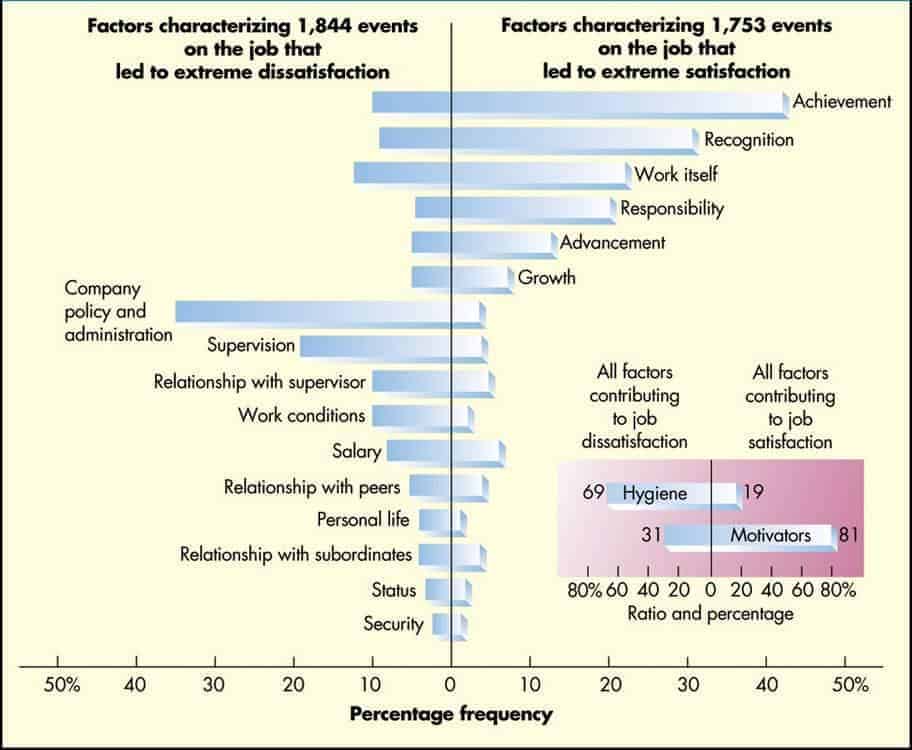"Ugh…I should have never taken this job."
No one wants that feeling, but it happens all too often. You had high hopes when you interviewed and then accepted your job, but now it's proving to be miserable.
When you take a job, you're unfortunately locked in. While the company can generally fire or lay you off at any time, it's hard for you to do much. No one wants super short stints on their resume, so you're likely stuck somewhere for at least a year.
You're not alone.
Most people are disengaged at work, and much of it is caused by their manager; Gallup shows us that the majority of the variance in engagement is caused by managers. Or put simply, people leave managers, not companies.
When you're interviewing that means the most important thing to do is understand if you would have a good manager or not. However, that's not easy to tell at the start of an interview process.
To avoid taking a job with a bad manager, here's 5 questions to ask an interviewer when it's your chance to learn about the company.
5 Questions to Ask an Interviewer to Learn About Your Manager
Interviewing is always hard. You're trying to put your best foot forward, and sometimes they don't manage the process well.
Information is also often intentionally asymmetrical; you may be a solid choice for them, but they may do certain things either to try to have negotiating leverage, or because they have another top choice they want to try to get first.
The best thing you can do is find out the key information you need to know to decide if you want to continue to pursue the role; why go through their hoops if it turns out the manager you'd work for is a nightmare?
Fortunately, there are simple ways to catch onto warning signs about your potential, future manager. Here's a few of them, with the questions to ask to reveal them:
1) Ask the manager: "How often do you have 1 on 1s with your team?"
Of all the questions to ask an interviewer, this is the most important. 1:1 meetings are the single best tool for good managers to lead their teams. If a manager rarely or never has them, that's a huge red flag.
What happens when there's a problem? How do they deal with issues that are important, but not yet fires? How do you get a hold of your manager when you need to talk to them for more than a few minutes?
Those questions are hard to answer if they don't have 1 on 1s to address them.
If you are inspired to try them out, then we recommend checking our one-on-one meeting template.
A Story: Struggling with communication
A friend took a job at what seemed like a great company and team. Unfortunately, not long after joining, the trouble began.
Their manager was rarely available. They claimed to have an "open door policy," yet they were hard to track down. Even if she got some time scheduled on their calendar, they'd often reschedule it or say something came up forcing them to cancel.
This left my friend with a variety of brewing problems. They couldn't get advice on how to handle issues that came up. They also had no way to get feedback on decisions they made. This led to curt criticisms from their manager, with little chance to learn how to correct them.
By the end of the first year, her relationship with her manager was a mess. Her performance review was mediocre and reflected the lack of communication. No one was happy with the situation, and so she quietly sought out her next job.
Good 1 on 1s make all the difference.
Without 1 on 1s with your manager, you're much more likely to end up with no outlet to fix problems. You'll also get less feedback than you need to perform well. This means you could be in for a big, unwanted surprise at review time.
The best thing you can do in your interview is directly ask them, or their team members, about 1 on 1s. You can learn a lot just from how they react to the question.
If they embrace it and talk about how important they believe they are, you'll be in a totally different environment than one that hopes these conversations randomly happen instead. (Hint: they won't happen, and that manager is probably stuck in reactive management mode).
Further reading:
- Here's more on why open door policies fail.
- And if you find yourself in reactive management mode, here's how to break out.
2) Ask an employee: "How often do people use < perk X>? Have you?"
One of the most common ways to recruit people, especially at high tech companies is to brag about all the perks:
- "Look at our great ping pong table/billiards/game systems”
- "We have this great room for recharging”
- "You can <perk/benefit>."
It's easy to get caught up in all the shininess. It's like you're going to summer camp and a job. Don't be fooled.
When they show you a perk that seems too good to be true, ask how often it gets used. Ask your future team members interviewing about any of them. You might be surprised to hear how much they're more for show than usage.
Can you take "unlimited vacation"?
One of the most common "perks" at startups is "unlimited vacation." The idea is you work all hours, so why count vacation so much more precisely?
Unfortunately, there's a dark side to unlimited vacation. In many cases, it leads to people taking less vacation (like UK company Triggertrap found).
In most cases, you're left to negotiate with your manager on whether you can take some of your "unlimited" time off.
Without a firm number to point to, you're at the mercy of your manager. A lax manager may always say yes, but if you're on an aggressive team, you may be pressured to take little.
Perks won't make you happy anyways.
Studies show what really makes people happy at work has little to do with perks. There's a bare minimum work environment people expect, but once that's met, perks don't boost happiness.
In Ferderick Herzberg's key research in the 1950s and 60s, he found that what motivates people is different than the hygiene factors that represent base needs and expectations of a workplace (see picture above).
As you can see, what will really make you happy is growth, rewarding work, recognition, and success in your role.
If you're interviewing at a company and they're really talking up their perks, take a hard look to see if they really are great, or they're just collecting dust. They may be trying to wallpaper over bigger problems.
Your questions to ask an interviewer should include asking about how their perks really get used (or not) and how much they do the things that really create happiness.

3) Ask Yourself: "How do people sit together?"
Often, companies will have you be interviewed by a group of the team at once. Or, they'll put you in a social environment with all or a big part of the team. If you know what to look for, this can be huge.
Watch where people sit.
More than half of all communication is conveyed non-verbally. If you know what to look for, there's a ton you can learn just by observing.
In an interview environment, one of the most telling things you can notice right away is how people sit in relation to each other. A tight-knit team will all sit closely together, and as they enter, filling in will be easy and fast.
For teams with problems, an elaborate dance will happen before your eyes. If there's cliques, they'll sit together and away from rival groups. If everyone hates their boss, everyone will avoid sitting near them, except perhaps one pet, favored employee.
A story: Avoiding the CEO
A friend of mine worked in a startup where there were problems between the team and the CEO. The CEO was quite unpopular at the time because of a series of unpopular decisions and festering problems.
When the team went to sit down for a group meeting around their big table, everyone waited for the CEO to sit down. Until that happened, there was an invisible magnet pushing everyone to the opposite end of the table no matter how the CEO shifted.
Shockingly, despite having plenty of seats around the table, everyone bunched around the opposite corner of the large table instead of evenly filling out.
Be aware of your surroundings and how the team currently interacts. While they may not all be as obvious as the bunched table story, a few reactions between different team members can tell you a lot. Even simple things like a series of physical objects placed between people can signal issues.
Further Reading:
- Learning to read body language is a skill that opens up a world as if you suddenly gained the ability to hear. If you want to learn about body language, there's no better place to start than "What Every Body is Saying" by a former FBI interrogator.
4) Ask Yourself: "What words did the manager use: We or Me? My or Our?"
Word choice matters. It signals a lot about someone's mindset. If you find a manager constantly using phrases like "my team” and "I did X” then that's a strong sign they may be a selfish manager.

Good managers protect their teams. They share and give credit to their teams. They're humble in looking at faults and ways to improve both themselves and their teams.
Bad managers protect themselves. They take the credit and pass the blame. They're critical of others, and often are not helpful in improving.
The word choice a manager uses as they interview you and ask them questions about their team can help you tell which side of the good vs. bad manager they're on.
Some questions you can ask to get a feel for this:
- "What was a recent big win the team had? What happened?"
- "When something doesn't work or a project stalls, what happens? How do you handle it?”
- Asking team members: "How do you get credit for your efforts? What happens when someone makes a mistake?"
Word choice works both ways.
Remember to be mindful of your word choices, too. You want to show why you're great in the interview, but don't take more credit than you deserve, either.
That same good manager that credits their team will want to hear you do the same. You can talk about how you were a key player, but don't forget to share credit with others you worked with. Show you're a team player, too.
The words people choose, especially how they take or share credit can tell you a lot about the environment you'll be entering if you take the job. Be sure to prepare questions to ask an interviewer to reveal their view on their team's versus their efforts.

5) Ask any interviewer: "What caused this role to become open?"
There's a big difference between a successful growing team, and one that's bleeding unhappy employees out the door. When you ask about how the role became open, you're really asking, "Is the team growing, or is the role to replace someone?"
Understanding why your role is open can then set you up for many other great questions and insights:
If the team is growing:
You know then that the team is getting more budget, and the manager is being trusted with more responsibility. Questions you can follow up with then:
- "Do you expect to grow much more in the future?"
- "Are there opportunities to change roles/advance?"
These can both open up interesting information about how your future organization is thinking about their growth. Do they promote from within? Are they thoughtful about growth, or partially out of control? You can then make a more informed decision if it's the right kind of growth for you.
If you're replacing someone:
Sometimes you'll replace someone who was fired, and many times it will be that the person quit. It's not a red flag on its own, which is why if you're comfortable (read the situation and trust your instincts) you can then ask:
- "How many people have left the team in the last 6 months?"
- "Do you know where those that left went?"
- "Why did they leave?"
Remember: People leave managers, not companies. If an employee left, the manager likely had something to do with it, whether because they didn't help the former employee grow, or actively drove them away. That's why it may be better to ask these of a team member who is part of the interview process instead of the manager directly.
Read between the lines.
Of course, sometimes people do leave for good reasons (like their spouse got a job in another part of the country, going back to school, etc). Listen carefully to how they talk about former employees; anyone who talks poorly about former employees is much more likely to also treat current employees poorly.
---
Taken separately, none of these are 100% deal breakers. A lack of 1 on 1s can be a huge warning sign, and when paired with a few of the others, should tell you all you need to know about avoiding a bad job offer.
Look for these as hacks to get more information in the limited time you have to gather info for yourself to make the right decision.









